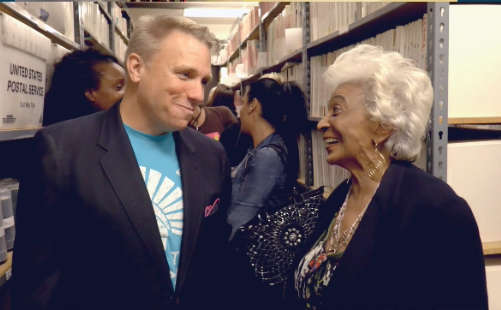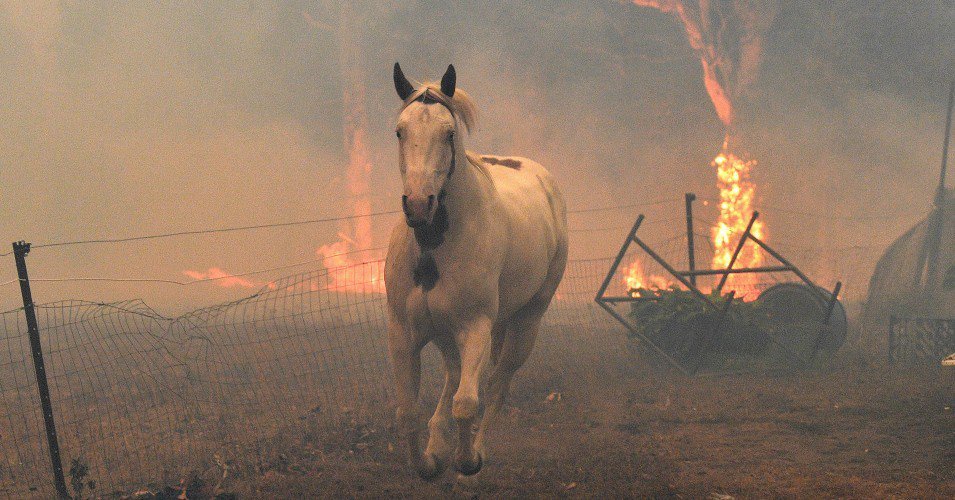
A horse attempts to move away from nearby bushfires at a residential property near the town of Nowra in the Australian state of New South Wales on December 31, 2019. (Photo: Saeed Khan/AFP via Getty Images)
A new report out Tuesday from the U.K. government framing the natural environment as "our most precious asset" says the world's destruction of biodiversity has put economies at risk and that a fundamental restructuring of global consumption and production patterns is needed for humanity's survival.
The 600-page review was commissioned by Britain's Treasury and authored by Partha Dasgupta, Professor Emeritus of Economics at the University of Cambridge, who wrote that gross domestic product (GDP) is a faulty measure of sustainable economic growth.
Business as usual = 💀
— Extinction Rebellion UK 🌍 (@XRebellionUK) February 2, 2021
The world at “extreme risk” by the failure of economics to take account of the rapid depletion of the natural world. #DavidAttenborough “If we continue this damage, whole ecosystems will collapse."#ActNow it's almost too latehttps://t.co/k7RKRPGf4S
In a foreword to the report, renown naturalist and TV host David Attenborough wrote that although we "are totally dependent upon the natural world," we "are currently damaging it so profoundly that many of its natural systems are now on the verge of breakdown."
Humanity is "plundering every corner of the world, apparently neither knowing or caring what the consequences might be," wrote Attenborough. "Putting things right will take collaborative action by every nation on earth."
"The Dasgupta Review at last puts biodiversity at its core and provides the compass that we urgently need," he added. "In doing so, it shows us how, by bringing economics and ecology together, we can help save the natural world at what may be the last minute—and in doing so, save ourselves."
The report argues that a recovery effort like that seen in the aftermath of World World II is necessary. "If we are to enhance the biosphere's health and reduce our demands, large-scale changes will be required, underpinned by levels of ambition, coordination, and political will akin to (or even greater than) those of the Marshall Plan," it states.
As the Associated Press reported:
Dasgupta called on the world to ensure demands on nature do not exceed sustainable supplies by changing food production and consumption, investing in natural solutions such as restoring forests, and protecting natural habitats. He said coordinated action now would in the long-run be less costly and would also help tackle other issues such as climate change and poverty.
Additionally, he pointed to a need to move away from using gross domestic product, or GDP, as a measure of economic success toward one that accounts for the benefits of investing in natural assets such as forests, soils, and oceans.
"Truly sustainable economic growth and development means recognizing that our long-term prosperity relies on rebalancing our demand of nature's goods and services with its capacity to supply them," Dasgupta said in a statement. "It also means accounting fully for the impact of our interactions with nature across all levels of society."
The coronavirus pandemic "has shown us what can happen when we don't do this," Dasgupta added. "Nature is our home. Good economics demands we manage it better."
 According to Bloomberg, "The review is the first time natural capital accounting—the act of quantifying ecosystems and their losses—has been discussed in detail by a mainstream economist with the support of the U.K. government." The outlet added:
According to Bloomberg, "The review is the first time natural capital accounting—the act of quantifying ecosystems and their losses—has been discussed in detail by a mainstream economist with the support of the U.K. government." The outlet added:
Academics have spent decades attempting to put a price on nature. A widely-cited study in 1997 estimated that the global flow of the earth's biosphere was valued at an average of $33 trillion per year—far higher than the global gross domestic product of that era.
Dasgupta said assigning absolute monetary values to nature would be meaningless because life would simply cease to exist if it was destroyed. The Indian-British economist called on governments to find an alternative to GDP as a way of measuring wealth, warning it is "wholly unsuitable" for ensuring sustainable development. Instead, he said, governments should use a more inclusive measure of wealth that accounts for nature as an asset.
"The message from the Dasgupta Review is clear," said United Nations Environment Programme chief Inger Andersen. "Securing nature is investing in our self-preservation."
"It is armed with this knowledge that in 2021 we must agree on an ambitious post-2020 global biodiversity framework that ends nature loss," she said.
The report was also welcomed by Marco Lambertini, director general of WWF International, who said its findings "are clear: nature underpins our economy and our wellbeing."
"Our failure to recognize this relationship, and take decisive and urgent steps to reverse nature loss, is costing us dearly and putting the future of humanity at risk," said Lambertini. "To safeguard our future, we must stop taking nature for granted as an expendable commodity, value its services, and transform our economies and finance systems so they are geared towards conserving and restoring the natural world on which we all depend."
"This should be required reading at @hmtreasury," tweeted Green Party MP Carolie Lucas of the report.
"Biodiversity and enhancing nature cannot be separated from economic policy," she wrote, calling for a replacement of "GDP growth with a wellbeing economy, starting with next month's budget."
The report was not without criticism from environmental advocates, including from author and climate activist George Monbiot, who took issue with putting a price tag on nature.
This, from the Dasgupta Review, is the mindset that has trashed the living world. Now, we are assured, it is the mindset that will save it. pic.twitter.com/EMBqTPp35g
— George Monbiot (@GeorgeMonbiot) February 2, 2021
In a set of tweets ahead of and after the report's release, Monbiot called the review's approach "morally wrong" and accused Dasgupta of promoting "a kind of totalitarian capitalism" in which "everything must now be commodified and brought within the system."
"Destruction is driven, above all, by the power of the rich. Regardless of how others value nature, those with power will destroy it, until their power is curtailed," Monbiot wrote.
"Dasgupta's natural capital agenda," he added, "is naive on many levels, but above all it is naive about power. Putting a social price on something does nothing to stop anti-social interests from exploiting it."
By Common Dreams Licensed under a Creative Commons Attribution-Share Alike 3.0 License
-
 Farewell to Sister Assumpta Oturu, Champion of African Voices
Farewell to Sister Assumpta Oturu, Champion of African Voices
Celebrating the life and legacy of Sister Assumpta Oturu, who amplified African stories and built bridges across continents through decades of fearless broadcasting.
-
 Cary Harrison Explains The Truth Behind The Mar-a-Lago Raid
Cary Harrison Explains The Truth Behind The Mar-a-Lago Raid
What would George Washington say? Secretly flying 35 filing cabinet drawers-worth of Pentagon secrets to your private hotel for favor-swaps was the straw to make all Presidents now raidable. Will this affect a future Trump 2024 run? What about Hunter and Hillary?
-
 The Cary Harrison Show, Tuesdays at 2PM
The Cary Harrison Show, Tuesdays at 2PM
Check out Cary's latest episode, including an interview and memories with the iconic actress Nichelle Nichols!
-
 The Cary Harrison Show, every Tuesday at 2PM!
The Cary Harrison Show, every Tuesday at 2PM!
The Cary Harrison Show, July 12, 2022 - Cary Harrison explains why the Jan. 6 hearings really matter! And Dr. Christopher Davis on stress and your heart.















